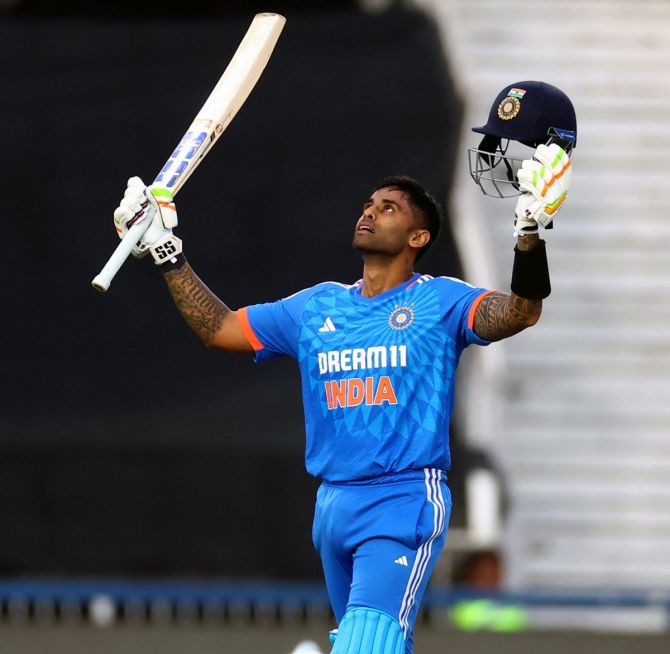Jasprit Bumrah, Rishabh Pant, Shubman Gill, K L Rahul, Suryakumar Yadav, Hardik Pandya: Who will succeed Rohit Sharma after he retires?
New Zealand's 3-0 whitewash may well begin the end of Rohit Sharma's tenure as India's Test captain. If India lose the Border-Gavaskar Trophy series in Australia, that could ensure Rohit's exit from the helm of India's Test team.
So who could lead India next? Jasprit Bumrah, the current vice captain? Or Rishabh Pant, who has captained an IPL team which Bumrah hasn't?
Jasprit Bumrah

The talismanic pacer, one of India's finest bowlers this century, has expressed a keen interest in assuming the mantle of captaincy.
Pros
Bumrah is a formidable candidate for captaincy, combining tactical intelligence with a composed demeanour on the field.
Having led India in a Test match and two T20Is, he has already shown calmness under pressure, coupled with the ability to make smart tactical decisions.
In a recent interview, he confidently stated, 'My favourite captain is me because I have captained a few games. Obviously, there are great captains, but I would take my name that I am my favourite captain.'
The 30 year old's intelligence, charisma and sheer skill make him a highly influential figure in the team, which could help him lead by example if given a more permanent captaincy role.
If Bumrah were to become captain, he would join a select group of bowlers who have led the team: Bishan Singh Bedi, S Venkataraghavan, Kapil Dev and Anil Kumble being the more recent examples.

Cons
However, Bumrah's injury-prone CV and workload concerns pose a significant challenge. His role as a frontline bowler is crucial to India's success, and the added pressure of leadership might exacerbate physical strain, risking burnout.
For India, the question remains whether the responsibility of captaincy could impact his longevity in the game, potentially jeopardising one of their key bowling assets. The team management would need to weigh these considerations before entrusting him with the captaincy crown full-time.
Rishabh Pant

Pant has staged a remarkable comeback to competitive cricket after a life-threatening car accident in December 2022.
Pros
Pant's aggressive style, both as batter and leader, has already drawn admiring notice. His impactful performances in high-stakes overseas Test matches and his proven leadership in the IPL with Delhi Capitals highlight his strategic thinking and fearlessness.
Pant's presence behind the stumps provides a unique vantage point, allowing him -- Dhoni-like -- to guide field placements and anticipate game dynamics.
Former cricketer Mohammad Kaif believes Pant has the potential to be a future captain: 'Rishabh Pant has got aggression, passion, and the ability to inspire the team.'
His aggressive approach to batting has been a saving grace for India in challenging conditions in Australia, England and South Africa, where he often rescued the team from precarious positions.
Cons
However, his inconsistency remains a drawback, and his tendency to rely on aggression could backfire under pressure in close contests.
His success as a leader in shorter formats has not yet fully translated into consistent Test performances.
To be a long-term captaincy option, Pant must demonstrate both consistency and maturity, especially in his decision-making, to solidify his position as a leader.
Shubman Gill

Gill's meteoric rise has made him a strong contender for future leadership roles. His consistent performances across formats, coupled with his unflappable demeanour, make him a potential successor to Rohit Sharma.
Pros
Gill was chosen to captain India A in the Duleep Trophy 2024, a squad that included experienced players like K L Rahul. His recent appointment as vice-captain for India's ODI and T20I series in Sri Lanka suggests he is viewed as a long-term option for white-ball captaincy.
The 25 year old showcased his class in the current World Test Championship cycle, amassing 879 runs at an impressive average of 61.98, including three centuries.
With the right guidance and opportunities, he could become one of India's most successful captains in the years to come.
Cons
Despite his evident leadership qualities, Gill's limited experience could make him vulnerable to pressure in high-stakes situations.
While he has shown impressive promise, he may still lack the strategic depth required to handle the complexities of captaincy at the highest level.
There's a risk that thrusting him into a leadership role too early could hamper his performance and growth as a player.
K L Rahul

The only player on this list to have captained India across all three formats.
Pros
He has led the national team in three Tests, 12 ODIs and one T20I, and has served as vice-captain in the Test set-up. His experience leading Punjab Kings and Lucknow Super Giants in the IPL highlights his credentials as a seasoned captain.
While Rahul's leadership abilities are undeniable, his recent form and fitness have been a concern. In the current World Test Championship cycle, he has played six Tests, averaging 37.66. However, he has shown glimpses of his class with key performances, including a stellar century in South Africa and a crucial 86 in the first Test against England.
Rahul successfully led India's ODI side to a 2-1 series victory against South Africa in November 2023 and captained the team during the tour of Sri Lanka in 2024. These experiences have given him valuable insights into managing a team at the international level.
His ability to perform consistently in challenging conditions, as demonstrated by his century at Lord's in 2021, is a testament to his skill and determination. As he continues to work on his fitness and consistency, Rahul remains a strong contender for future leadership.
Cons
However, Rahul's recent struggles with form and fitness are concerns that might hinder his captaincy prospects.
His inconsistent performances in Tests and other formats raise questions about his ability to lead from the front. His leadership record in the IPL has also faced scrutiny as he has struggled to convert individual brilliance into team success.
The BCCI management team may be hesitant to bank on him as a long-term captain due to these reliability issues.
Suryakumar Yadav

SKY is not part of the Test team, but has established himself as one of the world's most destructive batters in T20 cricket and a promising graduate from the Rohit Sharma school of friendly but effective captaincy.
Pros
As India's T20I captain, he has shown tactical acumen and a knack for inspiring his team-mates.
In 13 matches as captain, he has led India to 11 wins.
His aggressive approach and innovative shot-making have won him fans worldwide, making him a charismatic leader in the shortest format.
His ability to adapt and stay ahead of the game could prove invaluable in India's T20I set-up as they aim to build a strong squad for future tournaments.
Cons
However, SKY's limited presence outside T20 cricket restricts his utility as a potential all-format captain.
His lack of Test cricket experience and the absence of exposure in longer formats could limit his effectiveness as a full-time leader.
Given his age, he may not represent a long-term leadership solution, and his value might be better realised by focusing on his T20 role. This could pose a challenge if the team is looking for continuity across formats.
Hardik Pandya

Hardik's leadership potential remains intact. His all-round abilities and aggressive captaincy style make him a strong contender for the future.
Pros
Hardik's leadership in the IPL with the Gujarat Titans and his performance as T20I captain underline his profile as a dynamic leader.
The 31 year old's aggressive approach, on-field charisma, and all-around abilities make him a strong contender for the captaincy in white ball cricket.
His success rate as captain and ability to inspire his team have made him a fan favourite, reflecting his potential to contribute significantly to India's ODI and T20 success.
Cons
However, his fitness issues and the need for workload management have limited his captaincy scope, especially in longer formats.
His injury history raises concerns over his ability to sustain the demands of consistent leadership.
While he has the skills to lead, his physical limitations and the ongoing need for rest and recovery make him a less viable option for all-format captaincy.












 © 2025
© 2025